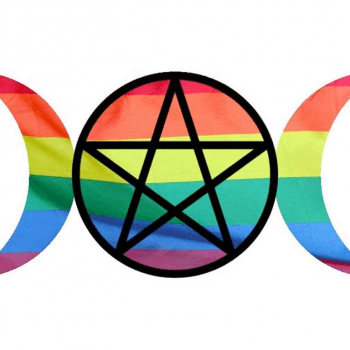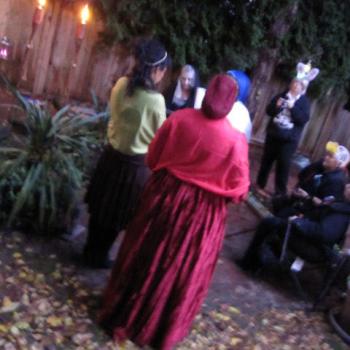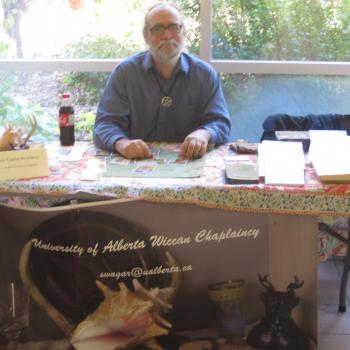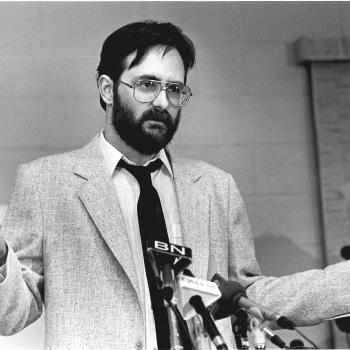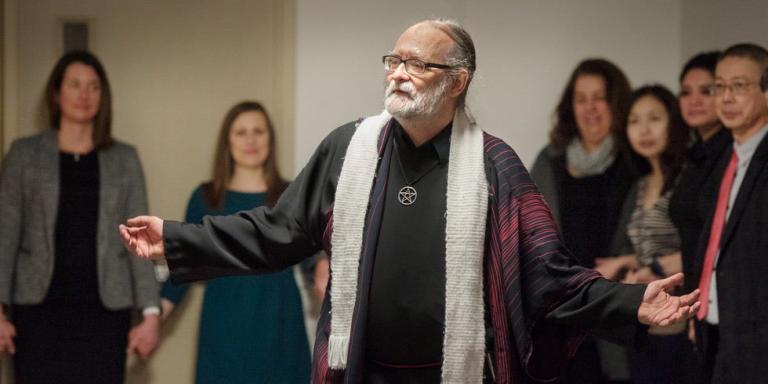
Every week through the school year, on Tuesday, Wednesday and Thursday afternoons, I head up to University of Alberta campus. I am the Wiccan chaplain to the University and have also been elected Chair of the Interfaith Chaplains’ Association there. My hours during summer term are a little less regular.
Being a chaplain has been the principal form that my service as a public clergy person has taken over the past four years since I was appointed. People often ask me what I do as a chaplain, what it’s like being the Wiccan chaplain, and so on. So, I’ll try to talk about it here.
University of Alberta has an explicitly multi-faith chaplaincy, with members representing a range of faith traditions, although most are Christian clergy of one stripe or another. In addition to myself, the non-Christians include the Muslim, Unitarian, and Jewish chaplains. We serve the entire university population, although mainly working with students, from the understanding that life, including academic life, is a spiritual journey.
I am here to assist students, faculty, and staff in being spiritually grounded and connected through offering qualified spiritual guidance, as well as assisting in finding community groups, activities, and resources of various sorts for religious fellowship and growth. I’m here for people of any religion, or none, although I mostly talk with Wiccans and other Pagans. I work together with chaplains from other faith communities to sacralise the university, and to draw out the ethical and spiritual parts of the life of study, research, learning and teaching.
I am also here to educate and inform people of other faiths (or none), of the basic beliefs and practices of Wicca (as a small minority religious path cannot expect to be well-known or understood without reaching out to explain itself). And, finally, my work here involves developing our church’s interfaith outreach and expertise, to learn from other faith groups, and to develop alliances around issues of common concern.
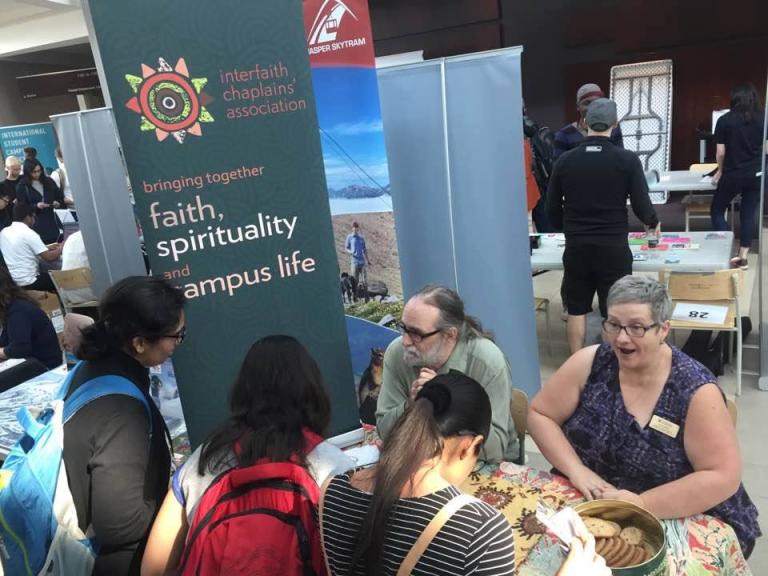
How did I get here? This is where the Gods have called me to be. But in practical terms, all recognized chaplains must go through an application and interview process and be voted upon by the other chaplains. We all are Called to serve this particular community – the community centred on research, teaching and learning. We all have significant post-secondary experience (I had an MA and am currently working on a doctorate). We are all educated and trained in the practical work of spiritual leadership, care and guidance, according to the requirements of our faith communities – basically, we are ordained or the equivalent. We are appointed by, and accountable to, our faith communities through a local support committee.
We must all be willing to work collaboratively with the other chaplains, be recognized and supported as clergy and/or paid staff of a faith community that is registered with the provincial government and whose beliefs, faith statements and financial records are transparent and open to public scrutiny. We are also each reappointed annually.
So, my Temple applied to appoint me. I provided a letter of application, and a cv. And a group of chaplains interviewed me and two members of the Temple Board about my qualifications, experience, and Call. That small committee reported to the whole Association and they voted as a body and I received a majority of votes in favour. (We have turned down applicants, so it was not guaranteed that I would be accepted.)
Since I was appointed in 2014, I have participated in a series of interfaith dialogues, been part of the chaplains’ presence at Orientation, offered emergency support to refugees from the great fires that destroyed part of Fort MacMurray two years ago, been part of the annual memorial ceremony for alumni, and in other ways worked cooperatively with other chaplains. I was appointed as the scheduler for the new Multi-faith Prayer and Meditation Space for the past two years, which is where my office is located now. I am very involved in encouraging student religious groups and faith-based initiatives in this space, especially those that are multi-faith. I also connect with Pagan students, faculty and staff, and offer regular meetings for worship in collaboration with Pagan students and my home Temple.
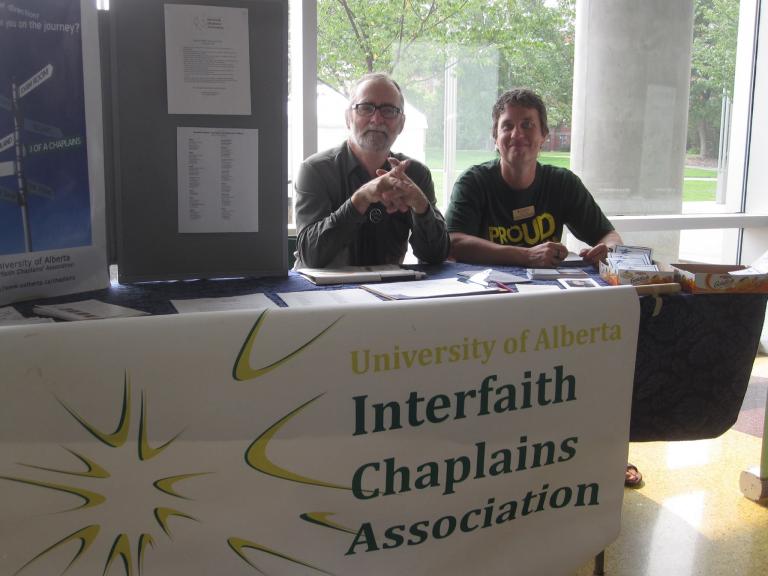
It’s difficult to find people to work with on an ongoing basis. This is true for my fellow chaplains from large religious traditions as well. Most students don’t know the chaplains exist, and so I’ve been doing things to make us visible. My most successful outreach has been weekly Tarot Tables in the Student Union Building – I book a space and spend Wednesday afternoons doing quick three-card readings for people and telling them about the Wiccan chaplaincy and the chaplains in general.
This service has been rich and meaningful. I have had the opportunity to help people get through crises, find groups to worship with, and have enjoyed teaching about my religion. I really enjoy those moments when I’m sitting at the Tarot Table and someone comes rushing up to me, delighted that there is another Wiccan on campus, and that I am a chaplain! (Happened four times last term!)
As Chair, I have liked working with the university brass to get things done, liaising with different groups around campus life issues – like the Food Bank around food insecurity and student poverty. I have also benefitted by Wicca still being a little unusual and so my chaplaincy has attracted a fair amount of publicity, which has rebounded to the benefit of the whole university and the chaplaincy.
If you are interested in this area of service, start with a search for the Call. You will not be getting paid, you will have some emotional and spiritual support from your fellow chaplains, but it will take years to build a presence on campus. So, this must be something that you are passionate about. Then check your skills and abilities – honestly, are you a good counselor, a kind person, a listener? Are you qualified – an Initiate, a recognized leader and public clergy person? And do you have community support – specifically from a legally recognized and formally organized religious body to which you are responsible? And it really helps to be able to be public and to be a student or instructor already connected to the school.








